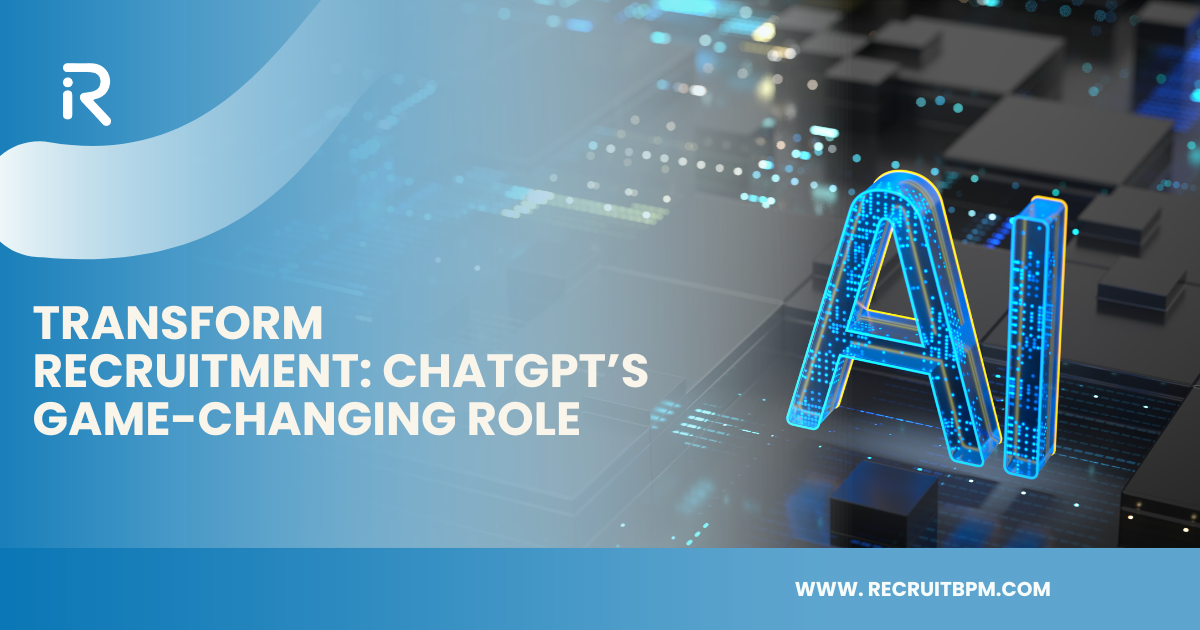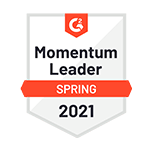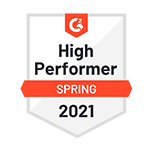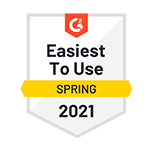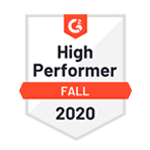Stay ahead of the game—discover why transform recruitment is the backbone of success today. Companies must adjust how they attract, engage, and retain talent. Hence, digital transformation in recruitment is not a trend but a necessity nowadays. With RecruitBPM and AI-driven platforms like ChatGPT, recruiters can streamline processes; they are faster, even more efficient, and highly data-driven. Transform Recruitment: AI, machine learning, and data analytics transform the very approach that was once old-fashioned, offering more than just a hassle-free and optimized recruitment experience. For example, RecruitBPM offers powerful feature management and automation modules to help recruiters focus more on strategic, decision-making tasks, similarly, ChatGPT brings conversational AI into recruitment to help companies offer real-time communication, enhance the candidates’ experience, and engage them more.
Thus, a lot more talent is onboarded, which analyzes masses of data feeding back on decisions and personalizes candidate journeys for more fit potentiality and retention levels. More companies wake up to these benefits; recruiters have much to step up to the system with some tools like RecruitBPM and ChatGPT to keep in step with industry standards. Transform Recruitment with new technology and transform every step of the recruitment funnel to cater to the demands of the modern day. The progress marks this organization’s potential capacity for attracting talent in a competitive market because of its following nature with the progress of digital transformation in recruitment. Technologically, recruitment transformation is not just a change but a strategic approach to aligning hiring with the bigger picture of digital transformation.
The Role of AI in Transforming Recruitment
Artificial intelligence has changed the face of businesses all around and greatly helped to transform recruitment. By means of efficiency and enhancement of the candidate’s experience, AI technologies like ChatGPT transform recruitment processes, therefore increasing the results.
1. AI-Powered Recruitment: A New Era
The recruitment process is being revolutionized by AI, which is replacing the slow and repetitive manual processes. A traditional process of recruitment can be very time-consuming and prone to error. AI can transform recruitment by automating candidate screening, parsing resumes, and talent matching, which could transform recruitment methods. This not only saves time but allows the best candidates to be identified quickly.
AI can scan a hundred resumes in seconds and pass on the screening of candidates with matching skills. Such automation saves time in varying proportions as well as it also allows the pick of the right candidates at an early stage. In addition to that, It continues to transform recruitment by allowing teams to prioritize strategic hiring and relationship development over administrative tasks.
2. How ChatGPT is Transforming Candidate Engagement
Probably one of the most significant benefits that ChatGPT brings to transform recruitment is its conversational capability. That is a very powerful tool as it can chat with a candidate at every single step of the hiring journey, such as answering FAQs to scheduling an interview, becoming a seamless communication channel to make candidates well-informed and engaged. It can transform recruitment by allowing recruiters to talk about consistency without any effort.
It builds a positive candidate experience through the automation of candidate engagement, which is crucial in attracting the right talent. Today, candidates expect a swift response and also expect to be transparent. The use of ChatGPT will easily meet their expectation by providing answers immediately with constant feedback to candidates at any stage of the hiring process.
3. New AI-Driven Hiring Processes
Above automation and engagement, AI exposes the possibility of completely new recruitment processes. For instance, with predictive analytics, an AI system can scan data in order to predict what a candidate will do in a given role. These AI applications help transform recruitment by allowing a more strategic approach to hiring.
Furthermore, AI-based processes learn and keep improving continuously; thus, the accuracy and relevance of these processes improve with time. This adaptability is very handy in business transformation recruitment, as trends or requirements always change their stance. Upon utilizing AI, recruitment agencies can adapt their processes to accommodate the changing nature of job requirements, which leaves them ahead of the competition.
4. Benefits for Recruitment Agencies
Many benefits, ranging from efficiency to better decision-making capability, come with AI integration in recruitment. Recruitment agencies can reduce their time-to-hire, create more affordable hiring procedures, and make hiring decisions more accurate with the introduction of such AI-powered tools, it can transform recruitment agencies to stay competitive.
The need to transform recruitment through digital innovation is no longer a choice but has become inevitable. Continuing to see rapid technological advancement, recruitment agencies embracing AI are better placed than others in meeting the needs of today’s candidates and employers.
How ChatGPT Enhances Recruitment Processes

ChatGPT transform recruitment and provides greater interaction between companies and job seekers and their HR departments. Advanced conversational skills possessed by ChatGPT enable ordinary recruitment processes to be more efficient and personalized in nature. The different ways in which ChatGPT is helping recruiters engage, screen, and then manage candidates to transform recruitment experience in its entirety will be discussed in this chapter. ChatGPT’s impact has been fundamental in redefining the methods to attain success in transform recruitment review processes.
1. Enhancing Candidate Engagement Through Automation
The most difficult challenges that involve transform recruitment include ensuring proper communication with every candidate involved; ChatGPT makes the process relatively easier because it can engage candidates at any level- from the point of initial engagement to post-interview follow-ups, all aimed to transform recruitment. Using its conversational AI, ChatGPT can engage with candidates in real-time, clarify any concerns or questions, provide information about the role, and even walk the candidate through the application process. The above kind of real-time responsiveness improves recruitment reviews and makes the candidate walk out with a positive view of the company, which is the ultimate result of transformation in recruitment as well.
Through the use of ChatGPT, recruitment has the capacity to delegate repeatable actions masses while still keeping clients up to date and active. Also, timely and appropriate contact with the applicants increases their level of satisfaction with the process of selection and recruits their willingness to leverage top talent to enhance further business support in transform recruitment reviews.
2. Streamlining Resume Screening and Candidate Shortlisting
Another very important point derived from using ChatGPT is how it can transform recruitment reviews into resume screening and shortlisting candidates. In the earlier days, reviewing resumes was time-consuming. Hence, every resume was checked carefully so that the skills, experience, and qualifications matched the job requirements. On the other hand, AI-driven tools like RecruitBPM can transform recruitment by sifting through thousands of resumes and bringing out candidates most suitable for a given job.
It speeds up the hiring process and has a lower chance of missing a high-potential candidate. It transform recruitment as it focuses only on the requirements of recruiters to get high-potential candidates without the time-consuming digging through hundreds of resumes manually, thereby making recruitment much better.
3. Automating Interview Scheduling and Follow-Up Communication
Another simplified task that helps transform recruitment is coordinating interviews using ChatGPT for recruitment teams. Finding a mutually convenient time for interviewing candidates sometimes necessitates several emails and calls on behalf of the recruiters. ChatGPT automates this to transform recruitment scheduling by offering candidates available slots and confirming appointments based on their preferences. This saves time for recruiters as well as candidates, hence improving the effectiveness of a business transformation recruitment process. This saves time for recruiters as well as candidates, hence improving the effectiveness of a transform recruitment process.
On post-interview follow-up communication, thank-you notes, feedback, or directions on the next step may be issued; handling these interactions helps transform recruitment by keeping candidates updated and generally easing their anxiety levels.
4. Supporting Recruiters with Real-Time Insights
Further with candidate interactions, ChatGPT supports transform recruitment by providing real-time to allow recruiters to make data-driven decisions. In this regard, by looking at replies engagement rates and other metrics, ChatGPT can offer recruiters actionable feedback on which type of communication strategy candidates are most receptive to. Information from this optimizes future interactions as it transform recruitment cycle by making it more efficient and effective. An updated communication strategy based on data usage is a mechanism to transform recruitment. That is to say, it allows the recruiters to create step-by-step better communication, which means which channels are preferable for the applicants and, therefore, enables them to attract better talent more often.
5. Enhancing the Candidate Experience with Personalized Interactions
In today’s job market, interactions mean everything to candidates. Thus, if the data collected is from past interactions, then ChatGPT can transform recruitment by ensuring meaningful individualized responses to the candidates.
This level of personalization can describe the importance of digital transformation in recruitment, and it represents uniqueness in the candidates’ needs and expectations. As a result of a personalized experience, ChatGPT produces stronger relationships with the candidates, thus increasing the probability of successful hiring and establishing a favorable reputation for the recruiting agency.
6. Increasing Overall Recruitment Efficiency
Recruiters can transform recruitment processes and instead focus on the strategic aspects of their jobs by automating multiple repetitive tasks and reducing manual interventions. Efficiencies gained during different stages of using ChatGPT at various recruitment stages contribute to reduced time-to-hire and cost-per-hire critical metrics in business transformation recruitment.
With ChatGPT, recruiters will spend more time on human-oriented tasks, like interviews and getting to know their candidates. It might force the recruiters and candidates to follow the best practices, which will lead towards a transform recruitment practice, with the alliance of automation with personal touch.
Personalized Candidate Outreach with ChatGPT
The unique elements of how ChatGPT transform recruitment are definitely related to personal outreach to candidates. Traditional recruitment tools automate tasks most of the time, while ChatGPT creates individual, customized messages that speak directly to a candidate. A customized message ensures recruiters make contacts and means that the candidate also feels appreciated and, hence, engaged with the process. The ability of ChatGPT to help digitize and transform recruitment strategies will be covered in this part.
1. Targeted Messaging Based on Candidate Profiles
Recruiters can personalize outreach efforts based on the candidate’s background, skills, experience, and career interests, helping to transform recruitment with this technology. To the extent a particular candidate fits the needs of an open role, ChatGPT can build a personalized message speaking directly to her background. A candidate with a software development background might receive an outreach message that includes specific technical skills needed for the job, possibly including some niche skills you find particularly interesting or relevant.
Another dimension of personalization forces business transformation in recruitment by enabling recruiters to focus on meaningful engagement rather than mass outreach. Targeted messages will attract the attention of the candidate, and then the recruiter will get connected meaningfully from the very beginning. This is one of the very important ways to transform recruitment for better results.
2. Using Candidate History to Refine Communication
One of ChatGPT’s key strengths is its ability to remember past interactions, which helps to transform recruitment by allowing recruiters to continue conversations with candidates seamlessly and consistently. For instance, if the candidate had shown earlier that he is interested in project management profiles, it would refer to such information in the later messages to let him know his preference and career goals are given due consideration.
This application of change and transform recruitment further underlines the fact that candidates need to be treated as individuals, not just applicants, they are considered to have a unique background that will support the element of trust and engagement that would greatly improve the candidates’ experience with recruiting agencies.
3. Crafting Role-Specific Outreach Messages
Apart from general information, it lets the recruiters send outreach messages tailored for every role. Therefore, for example, if a recruiter sends an outreach message to a marketing professional for some position in digital marketing, ChatGPT would emphasize key job responsibilities, essential skills needed, and other chances of growth held inside that position. Such a match between the message and the content of the position increases the chances of recruiters attracting attention from interested candidates.
Now is the time to modify the core recruitment concept: the right man at the right job. Better communication illuminates the candidate about the job that will reciprocate his skills, which eventually elaborates a growing prospect for a positive response.
4. Building Lasting Relationships with Passive Candidates
Not all of these passive job seekers are job-specific, but that doesn’t mean that they couldn’t be receptive in the future. What makes it possible to build that relationship with a passive candidate for a recruiter is the ability of the system to send consistent, personalized communication over time and regular messages of updates on openings or industry trends, for instance, to keep a person interested without flooding them.
By building such relationships, recruitment agencies can create the talent pipeline, and once again, the business transformation in recruitment will be supported by understanding long-term talent acquisition rather than immediate hiring needs. This approach helps to transform recruitment processes to ensure there are quality candidates available when roles open up. Engaging with passive candidates is a strategic way to transform recruitment, focusing on building relationships over time.
5. Enhancing Candidate Experience with Tailored Content
Personalized outreach is more than just messages with specific jobs. ChatGPT can share relevant company updates, industry insights, or professional development resources with the candidates. For instance, a software engineer receives articles on new emerging languages or possible tech events that can interest the candidate. This sharing of tailored content is very evident in the digital transformation in recruitment, which reflects a recruiter’s concern for the candidate’s longer-term success and growth.
Measuring and Optimizing ChatGPT’s Impact on Recruitment KPIs
Agencies will track the most relevant KPIs, such as time-to-hire, cost-per-hire, and candidate engagement metrics, to benefit fully from the usage of ChatGPT. Such metrics will thus be tracked and gauged to optimize usage so that the implementation leaves measurable improvements in hiring processes. The section will outline how such KPIs can be monitored and how data-driven insights can be used to transform recruitment goals. This is because frequent use of the same KPIs to check performance enhances the methods adopted by recruitment agencies and changes the outcomes of recruitment, which guarantees meeting both short-term and long-term targets.
1. Tracking Time-to-Hire Improvements
Perhaps the most important recruitment KPI is time-to-hire: the elapsed time between application and hire. This is where automation, as it is in ChatGPT, really takes off: screening resumes, communicating with job applicants, and scheduling interviews on the clock. The bottom line of all that automation is that recruiters can fill roles quicker, and companies don’t fall behind.
To measure ChatGPT’s impact on time-to-hire, recruiters can track the average time spent on each hiring stage before and after ChatGPT implementation. If time-to-hire decreases, it indicates that digital transformation in recruitment through ChatGPT will successfully make recruitment more efficient.
2. Reducing Cost-per-Hire
The cost-per-hire is another key metric, depicting all costs incurred in bringing a new hire on board. ChatGPT saves on that amount to a large extent, as no extra recruitment staff is required, job advertisements result in considerable cost savings, and manual activity is avoided to a considerable extent. Improvement in efficiency and decreased hiring expenditure go hand in hand with the automation of routine activities for recruiters. Cost per hire can be measured in comparison to the budgets the organization used to have in recruitment before and after introducing ChatGPT.
3. Monitoring Candidate Engagement Levels
The key is candidate engagement in determining their recruitment success, as engaged candidates will likely perform well when offers are made and hopefully accepted. ChatGPT would then be able to respond on time, personalize responses, and communicate what is happening and what will happen. This is particularly useful for change and transformation recruitment where candidate experience is the new means of attracting best talent.
The following engagement scores would be computed based on response rates, candidate feedback scores, and frequency of communication. Whereby the higher the levels of engagement, the better results the candidate experience will gain through ChatGPT and, thus, good hiring.
4. Evaluating Interview Show-Up Rates
It is really frustrating for the recruiters since it involves extra delay and cost if a candidate has to reschedule an interview. ChatGPT may be able to help secure a commitment from candidates by clearly and regularly communicating and reminding them to attend interviews. For instance, with automated reminder messages regarding dates, times, and locations of interviews, ChatGPT can reduce no-shows.
The recruiters will track scheduled interviews against completed ones to determine the show-up rates of ChatGPT in an interview. Anytime the rates go high, it is a sign that the digital transformation in recruitment has been successful because the communication and commitment levels of candidates have improved.
5. Optimizing ChatGPT’s Responses for Better Results
Another important area is ChatGPT’s optimization of responses based on interactions with candidates and feedback. Based on the types of questions asked and response patterns, recruiters can fine-tune ChatGPT’s language, tone, and messaging in the best interest of the candidates. This self-reinforced cycle supports business transformation in recruitment as ChatGPT delivers more relevant and effective responses over time.
For instance, recruiters can monitor analytics reports, which outline which responses receive positive or negative feedback, response times, and engagement success rates to optimize ChatGPT’s performance.
Transforming the Applicant Tracking System (ATS) with ChatGPT
ATS has been an essential tool for any recruitment agency in managing a pool of candidates. However, with integration with ChatGPT, opportunities emerge to modify how the ATS functions. Here, through the integration of the power of ChatGPT, older tracking models can now be upgraded with the help of automation, client engagement, and data-driven insights. The further sections will then unfold how ChatGPT is shaping up the use of ATS in recruitment to bring about the objectives of transform recruitment.
1. Streamlining Candidate Tracking and Management
An ATS in recruitment centralizes candidate information in one place, but managing that data manually takes a lot of time. ChatGPT, therefore, streamlines candidate management processes by automating routine tasks such as updating candidate records, keeping track of application statuses, and sending notifications. With the help of ChatGPT, recruiters will transform recruitment by quickly accessing the latest data from candidates, making tracking progress even easier and responding to candidates more promptly.
This automation is an example of how digital transformation in recruitment is happening. In this case, technology transform recruitment with better old procedures by upgrading them with AI and machine learning tools. Due to its facilitation of making things trackable manually, ChatGPT lets recruiters spend more time making decisions and less on paperwork.
2. Automating Interview Scheduling Within the ATS
Indeed, scheduling interviews might be the hardest part of the process to transform recruitment for both parties. With integration into an ATS, chatbots like ChatGPT can really help you transform recruitment by automatically setting up interviews. Running through available times and sending out auto-invites makes coordination as easy as ensuring that each party gets their notification and reminder on time, helping to transform recruitment into a seamless and efficient process.
This streamlines the process, sometimes mirroring business transformation in recruitment, as it does not waste time coordinating logistics, eliminates scheduling conflict, and transforms recruitment by increasing the overall efficiency of recruiting.
3. Collecting Feedback and Candidate Evaluations
Thus, feedback collected from interviewers and candidates is indispensable to transform recruitment strategies and assess fit. Collecting feedback using this ChatGPT is smooth and will transform recruitment right within the ATS. It can even send automated follow-up emails requesting feedback after interviews and collect responses, which recruiters can easily view, helping to transform recruitment processes seamlessly.
There is support for change and transformation recruitment through quick evaluation of candidate fit. Such automation of feedback helps transform recruitment, bringing closer what could have been missed in the hiring process. This readily available feedback allows recruiters to transform recruitment, enabling them to make better decisions and improve future recruitment cycles.
4. Providing Real-Time Insights on Candidate Progress
Integration of the ATS in recruitment with the ChatGPT will transform recruitment by allowing for real-time insights into how a candidate is progressing. For example, time spent at each stage of the recruitment process, candidate engagement levels, and response time—an insight that would enable recruiters to identify bottlenecks and make appropriate changes where necessary to ensure a smooth candidate experience.
This is related to the benefits of digital transformation in recruitment: data application for better effectiveness in decision-making and transparency. The recruiter can improve hiring by making sure that candidates are reminded at the right times to better their general experience with easy follow-up on their progress.
5. Improving Candidate Communication and Updates
A common candidate complaint is a lack of communication during the process to transform recruitment. Well, that is possible by sending automatic updates at each stage, enabling a candidate to know that his or her applications are received, he or she moves to the next stage, and decisions are made. This way, a candidate will not stay wondering, thereby reducing uncertainty overall. This does not make the candidates guess, hence uncertainty for them, and thus helps in transform recruitment while improving the company’s experience.
This better way of communication helps change how businesses recruit. It gives recruiters chances to maintain good relations with candidates. The candidates are properly informed by the automation provided by ChatGPT, thereby helping improve the image of the brand and, thereby, their recruitment results.
Actionable Insights for Recruiters: ChatGPT Best Practices
Following best practices that meet their objectives and hiring procedures will help recruiters transform recruitment and understand the advantages of ChatGPT. As well as these useful insights allows to transform recruitment agencies through using AI features to improve candidate engagement, simplify processes, and safeguard candidate data. In accordance with transform recruitment strategies, this section will address practical strategies for utilizing ChatGPT.
1. Set Up Automated Candidate Engagement Workflows
The first benefit of ChatGPT is the automation of engagement. Recruiters can also set up workflows where ChatGPT will send personalized messages at different stages of the recruitment process. Automatically send welcome messages when the candidates apply. Then, progress updates about their status and reminders for interviews will be sent. Such automated workflows ensure that communication with the candidates is done punctually and systematically, continuously keeping them updated and engaged. ChatGPT helps transform recruitment by enabling recruiters to send fewer manual messages while, on the other hand, candidates receive timely updates and guidance.
2. Customize ChatGPT’s Messaging for Different Candidate Groups
ChatGPT’s messaging should be tailored to transform recruitment strategies and suit different candidate groups, including entry-level, experienced professionals, or even people who are just passive candidates. In general, recruiters could fine-tune ChatGPT’s tone, frequency, and content to be suitable for any profile group. For example, entry-level candidates may want to be told more application instructions, whereas experienced applicants expect direct messages regarding the job responsibilities and culture of the organization.
This falls under transform recruitment in business transformation. Optimize candidate communication to attract and retain the best talent. Tailor messages and set up powerful relationships with various candidate pools through ChatGPT.
3. Incorporate Data Privacy and Security Considerations
The sensitive data recruited also requires addressing the issue of data privacy when applying ChatGPT. This is done by ensuring only accessible information by the data protection regulations and only accessing the data required for their assigned functions by ChatGPT. Access control measures and reviews of data practice will ensure the security of such information to transform recruitment and avoid unauthorized access.
Therefore, attention must be paid to data privacy within digital transformation to transform recruitment through proper usage of technology responsibilities and compliances. Candidate information will be protected, and recruiters will have earned the trust of their brand image.
4. Leverage ChatGPT Analytics for Continuous Improvement
With these interactions from candidates, rates of responses, and levels of engagement now available, they will help the recruiter study this data to understand what works best for messages or processes, work on improvement regarding those, and refine insights with the agencies to tailor ChatGPT’s responses to what the candidate expects.
This analytics-based approach supports change and transform recruitment by letting data in for continuous improvement. Using analytics, recruiters may understand what best works for the candidate and adapt ChatGPT’s communication style and strategies.
5. Implement Candidate Feedback Loops
Gathering feedback on interactions in ChatGPT would help comprehend the candidate experience. Recruiters can set up feedback loops for candidates to input the helpfulness and clarity of responses from ChatGPT. Their findings can assist recruiters in identifying pain points within communication and making suitable adjustments to transform recruitment effectively.
Candidate-centric business transformation in recruitment also establishes feedback loops. Gathering candidate insight enables the improvement of capabilities in ChatGPT based on the expectations of the next wave of applicants.
Competitive Edge with RecruitBPM: A Unique Value Proposition

Today, with the competition in the recruitment software markets, such platforms must transform recruitment reviews to provide unique value-driven features and gain leverage in offering the services. The integration of ChatGPT of RecruitBPM provides a powerful advantage in its capabilities to transform recruitment goals. How RecruitBPM has unique offerings In the following section, we will discuss:
1. ChatGPT Integration for Enhanced Candidate Engagement
While most recruitment software platforms offer applicant tracking and database management, RecruitBPM goes beyond that to transform recruitment through the conversational AI of ChatGPT by allowing real-time automated candidate engagement from the first outreach call to follow-up calls. With RecruitBPM users can transform recruitment reviews by personalizing their interactions with candidates at scale, achieving high candidate engagement with no additional manual work involved.
2. Streamlined Communication Workflows
With ChatGPT, RecruitBPM helps transform recruitment by bringing an even more streamlined workflow of communication than its competitors can. Traditional recruitment software usually requires manual input for scheduling or follow-up tasks. Since RecruitBPM automated these functions, for example, with scheduling, reminding, and updates on a candidate’s status, the applicant will still get all the communications while reducing the administrative workload. RecruitBPM’s communication facilitation is what makes it a tool for productivity in the recruitment industry.
3. Advanced Candidate Screening with AI
Another important domain in which RecruitBPM comes into play is candidate screening. Combining the AI-driven capabilities of ChatGPT, RecruitBPM can technically automate the initial screenings for skills, experience, and qualifications. It analyzes resume content very quickly and accurately to help recruiters quickly identify the best candidates without actual manual review. The advanced screening process transform recruitment of RecruitBPM better to enhance the quality and speed of hiring decisions.
4. Data-Driven Insights and Analytics
RecruitBPM is a data-driven space led by the power of ChatGPT that gives recruiters great analytics of candidate interactions, engagement rates, and efficiency in the recruitment cycle. For instance, the communication patterns analyzed for a recruiter might determine which messaging approaches can best engage candidates.
Analytics emphasis reflects changing and transform recruitment goals. The insights given by RecruitBPM allow agencies to continuously perfect their approach and get ahead of platforms that may not offer the same kind of data capabilities.
5. Competitive Pricing with High-Value Features
The competitive pricing model of RecruitBPM, with features powered by ChatGPT, really resonates with many agencies, particularly when compared to other websites. RecruitBPM is much better priced but has a high functionality; hence, it transform recruitment into an excellent solution for smaller recruitment agencies to introduce higher levels of AI into the workflow without adding expense.
The high-value features that are relatively inexpensive through RecruitBPM support business transformation in recruitment, thus, it becomes possible for agencies to modernize their respective operations without high cost.
6. Comprehensive Support for Digital Transformation Goals
The unique value proposition of RecruitBPM is the comprehensive support of agencies, especially in a time of digital transformation in recruitment. When integrated with ChatGPT, companies will have an opportunity to update their workflows, streamline their interactions with candidates, and manage the recruitment process. All aspects of the recruitment journey from outreach to onboarding are covered so that they transform recruitment and assist recruiters to have a versatile tool that adapts to their needs.
7. Focused on the Candidate’s Experience
Unlike most other ATS systems, RecruitBPM is very concerned with the candidate’s experience. This will ensure better simulating human-type conversations with these candidates to improve the experience along the hiring process for them, and thus engaged candidates not only kept abreast of updates but also ensured agencies enjoy a positive brand image while acquiring the best talent. This candidate-centric approach speaks to recruitment trends that transform recruitment around candidate experience.
Challenges and Solutions: Implementing ChatGPT in Recruitment
While presenting transform recruitment, integration still poses a challenge to recruiters. Recruiters might face challenges ranging from technical difficulties to data privacy concerns while trying to integrate ChatGPT into their workflow. Let’s find solutions targeted at agencies aimed at overcoming such obstacles. RecruitBPM makes it easy to achieve transform recruitment goals. Here are some common challenges and solutions when using ChatGPT and ATS in recruitment.
1. Challenge: Ensuring Data Privacy and Security
The biggest concern in any AI-driven tool is data privacy, and this is doubly true in recruitment. It deals with sensitive information regarding candidates. So, ensure that ChatGPT adheres to the norms of data protection. It is extremely important to maintain data security through access permissions, data storage, and privacy protocols.
Solution: The firm addresses this challenge by incorporating stringent security measures and data encryption to protect candidates’ information. In this regard, recruiters can set access controls within the RecruitBPM to restrict access to data only by authorized users in alignment with the digital transformation in recruitment practices that are overwhelmingly private and secure.
2. Challenge: Managing User Adoption and Training
Adapting to the tool for an unaware recruiter may take some learning. This sometimes impacts adoption because some members might not want to shift to new technology in their routine workflows.
Solution: It can simplify and transform recruitment process through friendly interfaces and support onboarding from RecruitBPM. RecruitBPM may provide its recruiters with full training materials and tutorials on how to use ChatGPT effectively. This user adoption focus for business transformation in recruitment thus ensures smooth integration and better outcomes, as it makes recruiters confident using ChatGPT.
3. Challenge: Maintaining a Balance Between Automation and Human Interaction
For instance, while ChatGPT can process many tasks, too much automation would defeat the personal touch candidates expect from their recruiters. The balance between automation and personal interaction is critical to ensuring no negative candidate experience.
Solution: RecruitBPM allows recruiters to customize ChatGPT’s workflows, enabling them to automate repetitive tasks which transform recruitment process while maintaining control over candidate interactions. Recruiters can set specific engagement points where human intervention is required, ensuring that change and transform recruitment goals are met without sacrificing personal connection.
4. Challenge: Avoiding Over-Dependence on AI for Screening
The screening function would be where an AI tool like ChatGPT would shine, but over-reliance might lead to missing a few subtle matters regarding candidates that must not go unnoticed. If human judgment is replaced by over-reliance on ChatGPT, it might even miss critical qualifications or experience.
Solution: A combination of the AI screening with human oversight, recruiters will see what ChatGPT is recommending and then can review and decide on that basis. This would allow for combining `transform recruitment benefits with the assurance that each candidate is seen and looked over properly.
5. Challenge: Integrating ChatGPT with Existing Recruitment Systems
Most recruitment agencies currently use ATS or other software, which would make integrating with ChatGPT very complicated. Clean communication would be essentially required between the existing platforms and ChatGPT for efficient recruitment workflows.
Solution: RecruitBPM is essentially set up to support all ATS and HR systems, so installation isn’t really a problem, as such flexibility enables the installation of ChatGPT without obstructing the modification of already implemented processes, propelling support for digital transformation in recruitment processes through upgrading rather than displacing previously used systems.
Final Thoughts
AI and digital transformation have been the machinery behind this changing landscape. In this age, RecruitBPM, powered by the great ChatGPT, can do its part in making the engagement between agencies and HR departments with candidates more efficient, streamlined, and data-driven to help bring about efficiency and personalized experiences for the candidates. Digital transformation in recruitment makes agencies competitive, attracts the best talent, and brings an efficient, personalized experience to the candidate.
We have seen that ChatGPT offers a lot to transform recruitment industry, ranging from automatic candidate engagement and interview scheduling to real-time insights and reduction of manual workloads. Out there is RecruitBPM, looking to amplify the benefits of these advantages in further business transformation in recruitment through AI-powered automation flexibility to uniquely address unique recruitment needs. Today’s recruiters are better positioned to manage demands through effective, secure, and candidate-centered stages of the hiring process.
Recruiting is finally maturing into the future since these tools can be used in highly automated, AI-powered technologies for the change and transformation of recruitment at a mass level. For agencies seeking a modern approach to harnessing power through AI-powered technologies, RecruitBPM is extremely powerful when integrated with ChatGPT.
Through automated systems like applicant outreach, interview scheduling, and data administration, RecruitBPM simplifies agencies. Candidates also get real-time information and insights to support operational process efficiency enhancement and better decision-making, as well as unique experiences. RecruitBPM helps companies to be responsive to each set of needs and industry standards to concentrate on strategic goals.
Are you ready to transform recruitment process by leveraging AI-driven tools? Learn what you can do with RecruitBPM for your agency. Get registered on the website of RecruitBPM to learn more about integration with ChatGPT and see how you can work toward digital transformation. Leap into the future of recruitment now with RecruitBPM and experience more streamlined and efficient hiring.
FAQs
Are recruiters going to be replaced by AI?
But if you’re a good recruiter, AI won’t replace you, it will just transform recruitment process. It will enable you to do more of the human elements of the role, to have better conversations, and to provide solutions to both hiring managers and candidates, but only if you embrace it.
How AI is transforming the future of HR?
Human Resources can free up their efforts on repetitive activities and transform recruitment allowing them time to focus on professional and human skills wherever need be. A good example of where AI and machine learning can help in saving time in the recruitment process.
How is AI transforming recruitment?
The AI searches for potential matches, reaches out to them, has preliminary interviews, evaluates resumes, and prepares the best for an interview. The AI algorithm transform recruitment process and connects people to jobs based solely on what they can do. They only provide demographic information about the applicants during the interview stage. That’s how AI-driven tools transform recruitment process overall.
What are Applicant Tracking Systems?
Understanding what are applicant tracking systems, a software product screened for recruiters and employers designed to screen applicants in the recruitment and hiring process. The software can be as simple as database functionality and would go all around the toolkit as well, allowing businesses of all sizes to filter and manage candidates effectively.
What is an AI recruiter?
AI recruiting refers to the practice whereby recruiters utilize AI tools meant to optimize or automate routine tasks so that their work and bias are reduced to the minimum. It is used at almost every point of the recruitment cycle to find the most suitable candidates in the shortest time possible.


